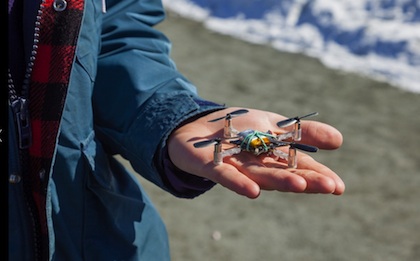Computer Science | News
Dartmouth Computer Science Students Forsake Robotics for Nanocopters
- By Dian Schaffhauser
- 04/08/14
Robotics are so 2013. Now students are building and deploying "nanocopters." At least they are in a Dartmouth College class led by Andrew Campbell.
As part of the college's computer science faculty Campbell teaches a software design and implementation class. Students previously programmed and raced robots, Campbell told Dartmouth Today. "But because our numbers in computer science classes are way up, I had to find a new project suitable for a larger class," he said. "I wanted to expose the students to cutting-edge challenges and the new revolution in how we will interact with computing devices in the future--through speech and gesture."
| |

Dartmouth students write code for nanocopters and control them with a Leap Motion controller. Photo by Martin Grant. |
|
The tiny wireless helicopters run an embedded operating system. For their penultimate project the students write code to run on the nanocopter itself and be controlled through a Leap Motion controller, allowing the pilot on the ground to drive the device with nothing but hand gestures.
"This is an extremely cool project," Campbell declared.
During the final testing, two-student teams flew 30 nanocopters on Dartmouth's green in the snow. The tiny devices leapt into the air with a swipe. "We decided on the green because we want everyone to know that programming and computer science are way cool here at Dartmouth," Campbell said.
One copter was lost that day. Said Campbell, "It flew to a high of 80 feet or so and looked like it disappeared into the sun. We mused that some kid will find a tiny device when the snow melts and wonder what it could be."
About the Author
Dian Schaffhauser is a former senior contributing editor for 1105 Media's education publications THE Journal, Campus Technology and Spaces4Learning.

